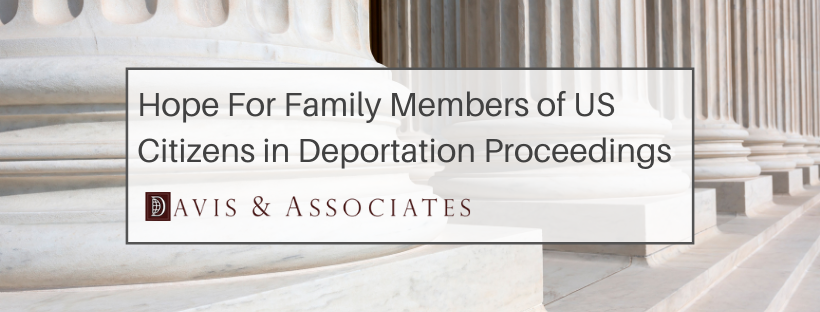
Deportation News: Administrative Closure Restored
The US Attorney General has issued a decision restoring Administrative Closure as a tool for Immigration Judges to use in removal proceedings to effectively manage their dockets.
With this decision, along with the recent memorandum restoring prosecutorial discretion to the ICE Office of the Chief Counsel, the deportation authorities again have the power to control the priorities of their caseloads and dockets.
In the 2018 decision matter of Castro-Tum, the US Attorney General issued a decision that immigration judges did not have the legal authority to grant administrative closure in removal proceedings.
This decision was a devastating blow to the ability of ICE, Immigration Judges and immigration practitioners to decide what cases should be treated with higher priority, and which were deserving of discretionary closing. By closing the cases deemed a lower priority from a law enforcement perspective, there was bandwidth to process higher priority cases more efficiently.
Who Could Qualify for Administrative Closure?
In determining which cases would merit a finding of low priority treatment, administrative closure and/or prosecutorial discretion, the government considers many factors. Some of those factors include:
Criminal record – Obviously those who commit crimes, are illegally in the US and subject to deportation from the US should be under heightened priority for enforcement.
Time in the US – The longer a person has been in the US, the higher the chance the person has built a life, family and other equities in the US.
Family ties to the US – This is a big one. A person who is married to a US citizen or resident or has kids born in the US should be given lower priority treatment in the deportation process. Keeping families together should be a priority where it makes sense to do that.
The reason the person is in removal proceedings – overstaying a visa is a less egregious deportable offense than dealing drugs or committing a violent crime, and should be treated as such.
The options for surviving removal proceedings- There are many options for someone to file an application for relief from deportation with the immigration court, including Political Asylum, Adjustment of Status, or Cancellation or Removal for Nonpermanent Residents. Someone who has a potential option to stay in the US and survive deportation with the approval of an application for relief should be a lower priority for deportation than someone who has no options.
Other factors should also be considered, such as risk of persecution in their home country, the likelihood of ICE being able to actually remove the person, a grant of benefits such as Temporary Protected Status or Deferred Action for Childhood Arrivals, or a pending family-based petition that could lead to permanent residence in the future.
Benefits of Administrative Closure
In my opinion, it was a huge mistake that the Trump Administration removed this enforcement prioritization policy. It significantly contributed to the drastic rise in the number of pending and active deportation cases.
The reality is there are only so many attorneys for ICE, and there are only so many immigration judges to process people for deportation. It only makes sense that with finite resources the government should have the tools to prioritize the cases with which they deem worthy to proceed. They should also have the authority to close cases for low priority cases, particularly when challenging country conditions await them in their home countries or they have significant family, business, property or other ties to the US.
It is wonderful that ICE and the Immigration Court have their prioritization tools restored to them. High priority cases will now be able to proceed because they will not be clogged by low priority cases.
The risk of someone without a criminal record and with family ties to the US being deported and disrupting their family has been drastically reduced in two actions of the Biden Administration. We will have to see how the individual Offices of ICE Chief Counsel and the various immigration courts and immigration judges implement these changes. I am personally optimistic that we will see very positive changes in the communities and families affected by the former draconian approach of immigration law enforcement.
Speak to an Immigration Attorney About Your Deportation Case
If you are facing deportation proceedings and would like to know how this change affects you, please reach out to our office for a face-to-face consultation at no charge. We also do phone and video consultations for a nominal fee. We will do our best to help you understand how this significant change will impact you and those you care about. We’re here to help!
About Davis & Associates:
Davis & Associates is the immigration law firm of choice in Houston & North Texas including Dallas, Fort Worth, Plano, Frisco, McKinney and surrounding areas. Their attorneys provide expert legal counsel for all aspects of immigration law, including deportation defense, writs of habeas corpus and mandamus, family-sponsored immigration, employment-sponsored immigration, investment immigration, employer compliance, temporary visas for work and college, permanent residence, naturalization, consular visa processing, waivers, and appeals. Attorney Garry L. Davis is Board Certified in Immigration and Nationality Law by the Texas Board of Legal Specialization.
Dallas Contact Info:
Address: 17750 Preston Road Dallas, TX 75252
Phone: (469)957-0508
Houston Contact Info: Address: 6220 Westpark Dr, Suite 110, Houston, TX 77057
Phone: (832) 742-0066
